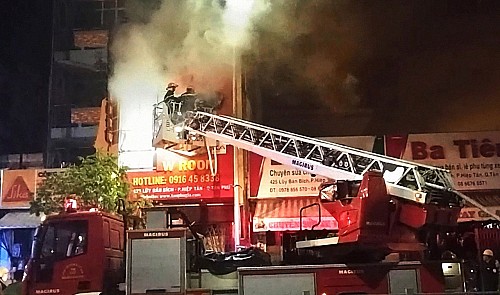Editor’s Note: Having lived in Ho Chi Minh City for 15 years, Roy has noticed several fire safety loopholes that local real estate developers in Vietnam are exploiting, endangering both residents and visitors.
The opinions expressed in this article are the author's own and do not necessarily reflect the view of Tuoi Tre News.
A few weeks ago I came across an article that said residential housing units built by Phu My Hung Corp were in great demand – a success that can be attributed to the professionalism of the company. They build and deliver what they promise: quality, safety, and sustainability at a reasonable price. In other words, their focus is on the consumer’s satisfaction and the protection of their customer’s investment. Contrast this mindset with the many unscrupulous builders in Vietnam who hold personal greed and illicit gain paramount, leaving consumers shortchanged, defrauded, and in jeopardy of losing both their investment and their lives.
Developers employ various methods to reduce the cost of residential buildings and line their pockets with the savings. One of the most egregious and criminal acts by these contractors is the failure to follow prescribed guidelines, specifications, building codes, and general contract law.
The failure to provide fire prevention and protection, and safe electrical wiring (a frequent cause of fires), is the most dangerous form of criminal negligence.
Any legitimate inspection of these structures would never allow occupancy. Instances of occupancy before structures have even been completed, inspected, and approved for retail are common in the city. In addition, completed buildings lack sufficient equipment to meet the pressure and flow needs of fire water to all floors. Other dangerous behaviors include blocking emergency entryways with parked cars, ignoring electrical codes, installing inadequate fire doors that fail to meet safety requirements, alarm systems not being installed except for “push buttons” on walls, installing alarms that do not work properly, failing to install entire fire protection systems, improper signage and access to fire extinguishers, and residents not having fire extinguishers in their homes.
One recent story spotlighted a contractor who only installed fire systems in a new building for inspection purposes and quickly removed the hardware once the initial inspection was completed so that it could be used in another building project.
Despite the fact that most buildings built in Saigon and elsewhere in Vietnam would never pass a third party inspection, they somehow seem to consistently pass fire police inspections.
An inspection recently done at my building complex is a perfect example of collusion between developers and authorities. The fire police arrived and completed paperwork before beginning their inspection. I told the building management and police that I would be accompanying them. Though they said I could not, I persisted and we walked into one building. We walked about 20 meters into a hallway and I had already pointed out several violations. The police and management quickly decided I would not be an asset to the inspection and I was taken away by the supervisor.
I could walk through many buildings throughout the city and find hundreds of violations (and I have at my own building, though the problems are completely ignored by the management). After speaking with my Vietnamese attorney about bringing a lawsuit against the contractors and management, I was told that it’d be better to move house and such a lawsuit could never be won in a Vietnam court. She also warned that I’d be putting my own well-being in jeopardy and cited an instance where thugs were hired to attack residents who tried to resolve another building dispute in Ho Chi Minh City.
It might be news to many that fire insurance is mandatory in Vietnam and having a gas detector is also required (a $150,000 insurance policy for an apartment and belongings would cost over $2,000 per year - how many can afford that price? Perhaps the premium is based on the effectiveness of the fire department - or lack thereof and the unsafe condition of buildings). The fact that the general public seems to be completely unaware of these mandates, coupled with the ignorance of local residents regarding fire safety, clearly seems like a disaster waiting to happen.
“Any business or individual found to be deliberately violating [construction] regulations will be subject to sanctions, from administrative fines to temporary suspension, even criminal prosecution, without exception,” the Vietnam News Agency quoted Lieutenant Colonel Bui Quang Viet, deputy head of the Department of Fire Prevention and Control, Rescue and Salvage, as saying on Jan 10, 2017.
And the Department of Fire Prevention and Control, Rescue and Salvage claims they will “strictly enforce fire safety” in all multi-storied buildings from the “blueprint phase.”
I’m glad to hear the commitment, but, after years of empty rhetoric, these statements don’t hold much water. This issue may require an act of the National Assembly, the President, or the Prime Minister of Vietnam to resolve.
























































